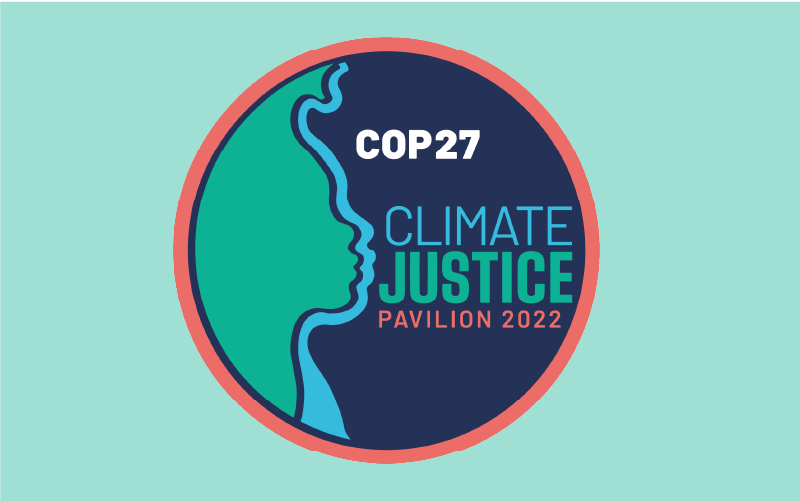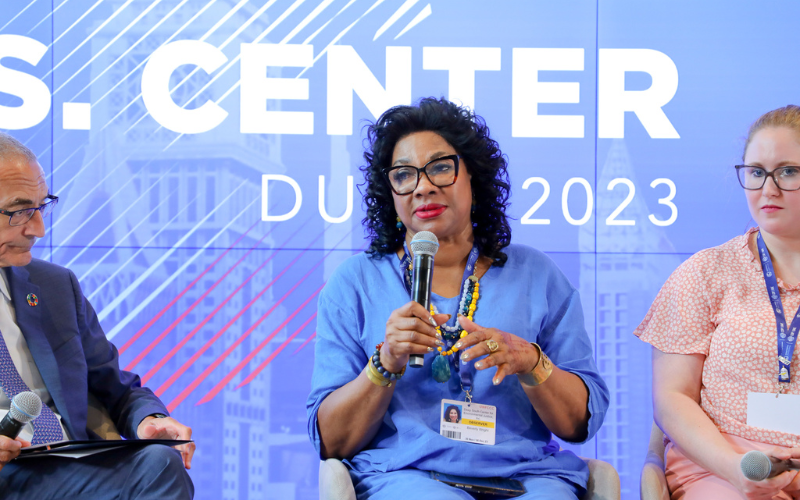
Nov 17, 2023 | Dr. Beverly Wright News, DSCEJ General News, International Connection News
November 17, 2023
Beyond Petrochemicals Hosts Environmental Justice Delegation at Global Plastics Treaty Negotiations in Nairobi (INC-3)
Nairobi, Kenya – As part of the Beyond Petrochemicals Campaign, Dr. Beverly Wright, founder and executive director of the Deep South Center for Environmental Justice, joined local leaders and community advocates from Texas, Louisiana, and the Ohio River Valley in Nairobi, Kenya this week to participate in the third session of the United Nations global plastics treaty process (INC – 3).
The delegation aims to elevate the invaluable role and experiences of frontline communities in the negotiation process. The communities included know firsthand the harm caused by the petrochemical industry and will provide an important perspective to the treaty process.
“The Mississippi River Chemical Corridor, or Cancer Alley produces one-fifth of the United States’ petrochemicals, and generations of Black and brown families have been exposed to these deadly chemicals due to the unchecked pollution of these neighboring industrial plants,” said Dr. Beverly Wright, founder and executive director of the Deep South Center for Environmental Justice. “Cancer Alley facilities remain Louisiana’s top pollution producers, and these negotiations are a bold step in the right direction to ensure all families can live and thrive in a healthy and pollution-free environment.”
“Those closest to the problem are usually the ones that have the solutions,” said Heather McTeer Toney, Executive Director of Beyond Petrochemicals. “We are honored to support these leaders and the work they are doing to protect the air, water and health of the places they call home.”
Petrochemicals are the building block for plastic production and account for 10 percent of global GHG emissions, which if left unchecked, will increase by 20 percent by 2030. Plastic pollution is both a global and a local issue. Communities in Louisiana’s Cancer Alley live with a 95 percent higher cancer risk than the rest of the country. Petrochemical facilities use and emit toxic chemicals linked to not only cancer but other health problems like respiratory and cardiac illnesses, which disproportionately affect people of color and low-income communities.

Nov 28, 2022 | Dr. Beverly Wright News, DSCEJ General News, International Connection News, The Latest News
Dr. Wright, Executive Director, Deep South Center for Environmental Justice, Talks Climate Justice Pavilion at COP27
FOR IMMEDIATE RELEASE: November 28, 2022
New Orleans, LA – Dr. Beverly Wright, Executive Director of the Deep South Center for Environmental Justice (DSCEJ) penned an op-ed in Ms. Magazine bringing attention to the first-ever Climate Justice Pavilion inside the Blue Zone at COP27, the 2022 United Nations Climate Change Conference, in Sharm El-Sheikh, Egypt. The Climate Justice Pavilion was created in collaboration with DSCEJ, WE ACT for Environmental Justice (WE ACT), and the Bullard Center for Environmental and Climate Justice at Texas Southern University (BCECJ).
In her piece, COP27’s Newest Headliner: Environmental Justice, Dr. Wright discussed how the environmental movement pushed for more equitable solutions to tackle the world’s biggest problems. The Climate Justice Pavilion was successful in its efforts to address the risk of carbon capture and storage technology to front-line communities and the need for just solutions to reduce carbon, assess the damage to underserved communities due to years of colonialism and environmental racism, and rethink climate reparations for poor communities burdened by the world’s richest people.
The COP27 Climate Justice Pavilion is a collaboration effort from Dr. Beverly Wright, Executive Director of the Deep South Center for Environmental Justice; Peggy Shepard, Executive Director of WE ACT For Environmental Justice; Dr. Robert Bullard, Director of Bullard Center for Environmental and Climate Justice, Texas Southern University; Fred Krupp, President of Environmental Defense Fund, Abigail Dillen, President of Earthjustice; Dr. Deb L. Morrison, CLEAR Environmental; Marina Macal, Instituto Clima e Sociedade; Cathy Eatock, Local Communities and Indigenous Peoples Platform; and Mithika Mwenda, PACJA, Pan African Climate Justice Alliance.
See below for excerpts from the op-ed, or read it in Ms. Magazine here.
COP27’s Newest Headliner: Environmental Justice
Dr. Beverly Wright, November 18, 2022
“This year, as I traveled to COP for the 13th time, my organization, the Deep South Center for Environmental Justice in partnership with WE ACT for Environmental Justice (WE ACT), and the Bullard Center for Environmental and Climate Justice at Texas Southern University (BCECJ) hosted a Climate Justice Pavilion designed to foster environmental justice conversations between diplomats, policymakers, businesses and professional advocates.
This first-of-its-kind pavilion brought together people from the Global South, the U.S. environmental justice movement and Indigenous peoples to highlight the voices of communities disproportionately impacted by our climate crisis. The pavilion focused on historically overlooked sectors of climate policy, including the risk of carbon capture and storage technology to front-line communities and the need for just solutions to reduce carbon.”
***
“Environmental justice must be at the forefront of every conversation about climate change and what our country and others will do to reverse the dangerous path we are on. From the passing of the Inflation Reduction Act in the United States to the significance of hosting a climate conference on the content of Africa, we welcome the opportunity to make bolder strides toward environmental and climate justice.”
Click here to read the full op-ed.

Oct 25, 2022 | DSCEJ General News, International Connection News, The Latest News
Deep South Center For Environmental Justice, WE ACT for Environmental Justice, and the Bullard Center for Environmental and Climate Justice Join International Partners for Historic Environmental Justice Presence in the Blue Zone
FOR IMMEDIATE RELEASE: October 25, 2022
(New Orleans, LA) – The Deep South Center for Environmental Justice (DSCEJ), WE ACT for Environmental Justice (WE ACT), and the Bullard Center for Environmental and Climate Justice at Texas Southern University (BCECJ) will debut the first-ever Climate Justice Pavilion inside the Blue Zone at COP27, the 2022 United Nations Climate Change Conference, in Sharm El-Sheikh, Egypt, November 6-18, 2022. The pavilion will bring together representatives from the Global South, the U.S. Environmental Justice Movement, and Indigenous peoples to spotlight the voices of communities disproportionately impacted by climate change.
The IPCC reports consistently raise the alarm about the worsening impacts of climate change on the most vulnerable communities, countries, and island states. Yet, the voices, stories, and perspectives of residents of these localities are rarely heard, communicated, or promoted – despite the increasing incidence of climate migration due to extreme weather events that cause flooding, destruction, drought, and soil and coastal erosion. The Climate Justice Pavilion will help to bridge that gap by serving as a space for productive conversations in the Blue Zone, which is where the majority of diplomats, policymakers, business, and professional advocates convene at COP27.
Historically, grassroots groups and activists have been providing environmental justice programming for years in the conference’s Green Zone which is geographically isolated from the Blue Zone. Because of this segregation, a collaboration was developed to build a Climate Justice Pavilion where individuals from the Global South, the U.S. Environmental Justice Movement, and other international movements can dialogue on issues including:
- Connecting the people of the global migrating south forced to flee their homes because of unsafe communities due to outsized natural disasters or life-taking pollution;
- The risk of carbon capture and storage technology to front-line communities and the need for just solutions to reduce carbon;
- Climate Finance and the need to support communities with mitigating and adapting policies that will address climate change;
- Loss and damage to underserved communities due to years of colonialism and environmental racism;
- The need for energy justice, including equitable reparations for communities historically harmed by climate change;
- and climate reparations for poor communities burdened by the world’s richest people.
“Women, children of color and the communities where they live are too often an afterthought when talking about climate justice. The first-ever Climate Justice pavilion will provide a global stage to highlight their stories and others, encouraging governments to develop policies and clean energy transition plans that are inclusive, equitable, and reflect research on the effects on our communities.” said Dr. Beverly Wright, Executive Director, Deep South Center for Environmental Justice. “The Global South from the United States to Africa is bearing the brunt of our climate crisis. Natural disasters coupled with centuries of colonialism and racism that underpin global environmental policy have devastated countless communities. This pavilion will challenge the world’s best and brightest to reimagine how to tackle climate change and protect the most vulnerable all around the world.”
“You cannot talk about solving the climate crisis if the people most impacted are not at the table,” said Peggy Shepard, Co-Founder and Executive Director of WE ACT for Environmental Justice. “The historic nature of the Climate Justice Pavilion cannot be understated, as it creates a space for those voices, their stories and perspectives, to be heard by decision makers on the international stage. We look forward to elevating the discussion of climate migration, energy justice, and the risk of false solutions to our communities as well as the need to center equity when addressing climate change.”
“The significance of COP27 in Africa underscores the importance of environmental justice and the significance of our first-ever climate justice pavilion. Those who visit the pavilion will hear about sectors of climate policy routinely overlooked and marginalized because of historic environmental racism,” said Dr. Robert Bullard, Director, Bullard Center for Environmental and Climate Justice, Texas Southern University. “We will host discussions on climate finance, loss and damage, energy justice, and climate reparations, among the topics most important to vulnerable communities bearing the brunt of the climate crisis around the world. I am very excited about what our team and the Climate Justice Pavilion are bringing to this year’s conference.”
A delegation of over 40 representatives of grassroots communities; Students of Historically Black Colleges and Universities (HBCUs); and staff support will accompany the collaboration to manage logistics, travel, programming of the pavilion, and relevant research.
The COP 27 Climate Justice Pavilion is a collaboration effort from Dr. Beverly Wright, Executive Director of the Deep South Center for Environmental Justice; Peggy Shepard, Executive Director of WE ACT For Environmental Justice; Dr. Robert Bullard, Director of Bullard Center for Environmental and Climate Justice, Texas Southern University; Fred Krupp, President of Environmental Defense Fund, Abigail Dillen, President of Earthjustice; Dr. Deb L. Morrison, CLEAR Environmental; Marina Macal, Instituto Clima e Sociedade; Cathy Eatock, Local Communities and Indigenous Peoples Platform; and Mithika Mwenda, PACJA, Pan African Climate Justice Alliance.
Sponsors Include: Bloomberg Philanthropies, Environmental Defense Fund, Earthjustice, Union of Concerned Scientists , The Kresge Foundation , National Wildlife Federation, Center for American Progress, The David and Lucile Packard Foundation, Sierra Club, Natural Resources Defense Council, and Columbia Climate School.
About the Deep South Center for Environmental Justice
Families in the Gulf Coast deserve to live in communities that are free from deadly air and are more resilient to climate change and extreme weather. The Deep South Center for Environmental Justice (DSCEJ) works to empower and engage communities to put environmental justice and equity at the center of all climate action. Led by environmental justice scholar and advocate, author, civic leader and professor of Sociology Dr. Beverly L. Wright, the DSCEJ uses research, education, and community and student engagement to advocate for policy change, lead health and safety training for environmental careers, develop social and emotional community wellness programs, and create new and environmentally healthy opportunities for the residents of communities disproportionately impacted by historic environmental injustice.
About WE ACT for Environmental Justice (WE ACT)
WE ACT for Environmental Justice is a Northern Manhattan membership-based organization whose mission is to build healthy communities by ensuring that people of color and/or low-income residents participate meaningfully in the creation of sound and fair environmental health and protection policies and practices. WE ACT has offices in New York and Washington, D.C.
About the Bullard Center for Environmental and Climate Justice at Texas Southern University (TBC)
The Bullard Center for Environmental and Climate Justice at Texas Southern University addresses longstanding issues of systemic inequality and structural racism that cause disproportionate pain, suffering and death in Black and other people of color communities. The Center is directed by environmental justice scholar Dr. Robert D. Bullard and is housed in the Barbara Jordan-Mickey Leland School of Public Affairs. It strives to be a leading force for transformative environmental, climate, and racial justice using rigorous science, community-driven research, policy, civic engagement programming, and effective advocacy.




